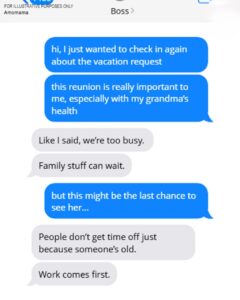
“Work comes first!” My boss, whom I’ll refer to as “Mean Boss,” declared flatly, rejecting my request for vacation time to see my dying grandmother. It was then that I realized I needed to show him why denying my leave was not only a mistake but a significant one.
I had been working under Mean Boss for nearly five years. During this time, I came to understand his rigid view on vacations—he saw them as an unnecessary luxury. He’d often scoff at the very mention of time off, insisting that weekends were sufficient personal time. His attitude was that any personal or family event, no matter how significant, was secondary to work demands.
One memorable incident involved my coworker Jake, who came to work despite being seriously ill with the flu. Mean Boss’s response was as cruel as it was thoughtless—he told us to prop Jake up in his chair so he wouldn’t appear to be incapacitated if clients walked by. This incident was a stark example of how he prioritized the company’s image over employee well-being.

Despite the overwhelming evidence that his management style was detrimental, I initially tried to justify it. Work can be demanding, and I rationalized that sometimes sacrifices are necessary. However, after observing my colleagues struggle and burn out under his rule, I realized the problem was deeper—it was about control. Mean Boss seemed to thrive on the idea that the company could not function without his constant oversight.
When my extended family planned a reunion—the first in over a decade—I knew I couldn’t miss it. My grandmother, Daisy, was in declining health, and the family consensus was that this might be our last chance to gather while she was still with us. I submitted my vacation request six months in advance, ensuring ample time for adjustments or temporary replacements.
The next day, Mean Boss summoned me to his office. The moment I stepped inside, I could tell it wasn’t going to be good news. His eyes were cold and unyielding as he said, “We can’t afford to lose you for a week. This is one of our busiest times.”
I tried to explain the situation, but he cut me off, insisting that “family reunions can be rescheduled” and that “work comes first.” He didn’t even consider the importance of my family event or the advance notice I had given. His response was dismissive and left me feeling both frustrated and powerless.
That evening, I found myself grappling with the decision. I knew missing this reunion meant missing potentially precious last moments with my grandmother. I felt compelled to take a stand. That night, I drafted my resignation letter, fueled by a mix of anger and resolve. I decided that I would no longer work for someone who devalued personal lives to this extent.
The following morning, I handed in my resignation letter. Mean Boss’s reaction was a blend of shock and irritation. “You’re quitting over a vacation?” he asked incredulously. I firmly explained that I was resigning because I refused to work for someone who did not respect his employees’ lives outside of work. I chose my family over a job that treated me like a cog in a machine.
As I prepared to leave, Mean Boss tried to guilt-trip and bribe me to stay, but I remained steadfast. My departure was a mix of relief and sorrow. Jen, a coworker, later informed me that Mean Boss was struggling to manage the workload alone, a clear indicator of how dependent the company had become on me.
I spent the following week with my family, making the most of the time with my grandmother. Despite the initial heartbreak, I felt an immense sense of peace and accomplishment. Meanwhile, my former boss was forced to confront the reality of managing without me, which seemed to make him understand the real value of his employees.
A week later, as I sat with Grandma Daisy on a beach, her frail hand clasped in mine, I received a message from Jen. Mean Boss was working long hours, clearly feeling the strain of his decision. It felt like a small but satisfying piece of justice.
Grandma smiled up at me, her eyes twinkling despite her frailty. “I’m so glad you’re here, sweetheart,” she said. And in that moment, I knew I had made the right choice. The balance between personal and professional life isn’t always easy to achieve, but sometimes, standing up for what matters most leads to the most rewarding outcomes.





